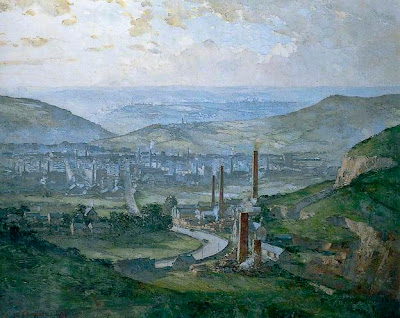There are those who revel in that final step. Or so they say.
Fall leaves fall die flowers away
Lengthen night and shorten day
Every leaf speaks bliss to me
Fluttering from the autumn tree
I shall smile when wreaths of snow
Blossom where the rose should grow
I shall sing when night's decay
Ushers in a drearier day
Emily Bronte, in Janet Gezari (editor), Emily Bronte: The Complete Poems (Penguin 1992).
The text above is as it appears in Bronte's manuscript, untitled and without punctuation. The poem was not published until 1910. It often appears in editions of Bronte's poems and in anthologies with punctuation added by modern editors. For instance:
Fall, leaves, fall; die, flowers, away;
Lengthen night and shorten day;
Every leaf speaks bliss to me,
Fluttering from the autumn tree.
I shall smile when wreaths of snow
Blossom where the rose should grow;
I shall sing when night's decay
Ushers in a drearier day.
Clement Shorter (editor), The Complete Poems of Emily Bronte (1910).
Being used to the punctuated version of the poem, the unpunctuated version seemed a bit odd when I first encountered it in the Penguin edition. But I now prefer it: the lack of punctuation seems to create a force and a flow that fit well with the emotion expressed in the poem. One senses the rush of feelings.
Rex Vicat Cole (1870-1940), "The Mill" (1922)
I had never thought of the following poem in conjunction with Bronte's poem. But, by chance, I read them a few days apart recently, and I was struck by the similarities. But I may be mistaken.
My November Guest
My Sorrow, when she's here with me,
Thinks these dark days of autumn rain
Are beautiful as days can be;
She loves the bare, the withered tree;
She walks the sodden pasture lane.
Her pleasure will not let me stay.
She talks and I am fain to list:
She's glad the birds are gone away,
She's glad her simple worsted gray
Is silver now with clinging mist.
The desolate, deserted trees,
The faded earth, the heavy sky,
The beauties she so truly sees,
She thinks I have no eye for these,
And vexes me for reason why.
Not yesterday I learned to know
The love of bare November days
Before the coming of the snow,
But it were vain to tell her so,
And they are better for her praise.
Robert Frost, A Boy's Will (1913). (A side-note: in my previous post, I mentioned that, when A Boy's Will was first published, Frost included, in the table of contents, a one sentence gloss for each poem. His gloss for "My November Guest" was: "He is in love with being misunderstood.")
I am not suggesting that there is any intentional echoing of Bronte by Frost. I have no idea whether he was even aware of the poem. Rather, I am thinking of "my Sorrow." I'd say that "my Sorrow" is something that the two of them had in common.
Rex Vicat Cole, "Landscape with Farm" (c. 1938)
Finally, although I remain firm in my oft-stated position that it is unfair to pigeonhole Thomas Hardy as a "pessimist," he can conjure up a dark and stormy Dorset autumn night that is every bit as harrowing and portentous as a dark and stormy Bronte Yorkshire moor autumn night.
Night-Time in Mid-Fall
It is a storm-strid night, winds footing swift
Through the blind profound;
I know the happenings from their sound;
Leaves totter down still green, and spin and drift;
The tree-trunks rock to their roots, which wrench and lift
The loam where they run onward underground.
The streams are muddy and swollen; eels migrate
To a new abode;
Even cross, 'tis said, the turnpike-road;
(Men's feet have felt their crawl, home-coming late):
The westward fronts of towers are saturate,
Church-timbers crack, and witches ride abroad.
Thomas Hardy, Human Shows, Far Phantasies, Songs and Trifles (1925).
Rex Vicat Cole, "Sompting Church, Sussex"


















